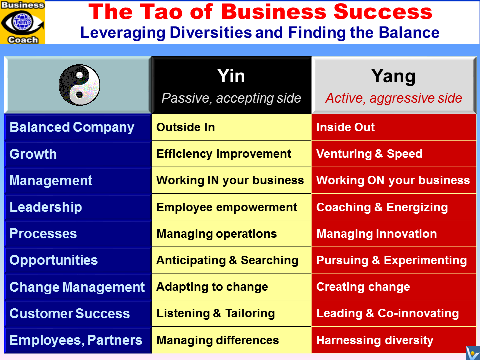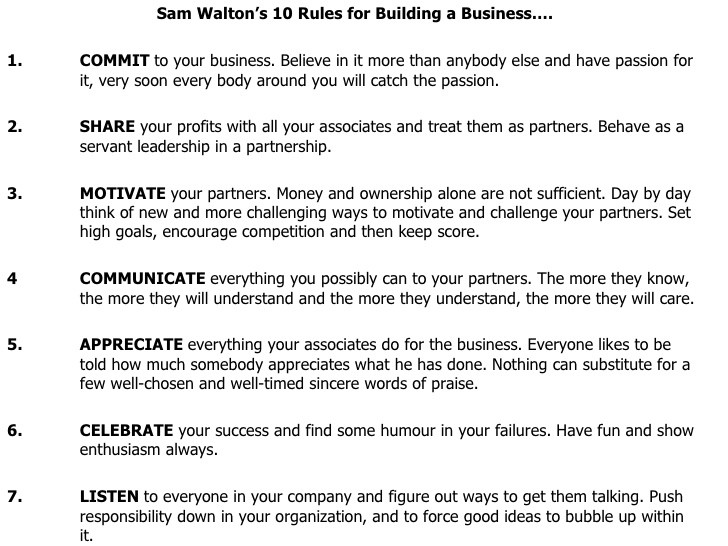Sam Walton 10 Rules for Building a Successful Business
Post on: 16 Март, 2015 No Comment

Sam Walton, the founder of Wal-Mart, grew up poor in a farm community in rural Missouri during the Great Depression. The poverty he experienced while growing up taught him the value of money and to persevere.
After attending the University of Missouri, he immediately worked for J.C. Penny where he got his first taste of retailing. He served in World War II, after which he became a successful franchiser of Ben Franklin five-and-dime stores. In 1962, he had the idea of opening bigger stores, sticking to rural areas, keeping costs low and discounting heavily. The management disagreed with his vision. Undaunted, Walton pursued his vision, founded Wal-Mart and started a retailing success story. When Walton died in 1992, the familys net worth approached $25 billion.
Today, Wal-Mart is the worlds #1 retailer, with more than 4,150 stores, including discount stores, combination discount and grocery stores, and membership-only warehouse stores (Sams Club). Learn Sam Waltons winning formula for business.
Rule 1: Commit to your business.
Believe in it more than anybody else. I think I overcame every single one of my personal shortcomings by the sheer passion I brought to my work. I dont know if youre born with this kind of passion, or if you can learn it. But I do know you need it. If you love your work, youll be out there every day trying to do it the best you possibly can, and pretty soon everybody around will catch the passion from you — like a fever.
Rule 2: Share your profits with all your associates, and treat them as partners.
In turn, they will treat you as a partner, and together you will all perform beyond your wildest expectations. Remain a corporation and retain control if you like, but behave as a servant leader in your partnership. Encourage your associates to hold a stake in the company. Offer discounted stock, and grant them stock for their retirement. Its the single best thing we ever did.
Money and ownership alone arent enough. Constantly, day by day, think of new and more interesting ways to motivate and challenge your partners. Set high goals, encourage competition, and then keep score. Make bets with outrageous payoffs. If things get stale, cross-pollinate; have managers switch jobs with one another to stay challenged. Keep everybody guessing as to what your next trick is going to be. Dont become too predictable.
The more they know, the more theyll understand. The more they understand, the more theyll care. Once they care, theres no stopping them. If you dont trust your associates to know whats going on, theyll know you really dont consider them partners. Information is power, and the gain you get from empowering your associates more than offsets the risk of informing your competitors.
A paycheck and a stock option will buy one kind of loyalty. But all of us like to be told how much somebody appreciates what we do for them. We like to hear it often, and especially when we have done something were really proud of. Nothing else can quite substitute for a few well-chosen, well-timed, sincere words of praise. Theyre absolutely free — and worth a fortune.
Find some humor in your failures. Dont take yourself so seriously. Loosen up, and everybody around you will loosen up. Have fun. Show enthusiasm — always. When all else fails, put on a costume and sing a silly song. Then make everybody else sing with you. Dont do a hula on Wall Street. Its been done. Think up your own stunt. All of this is more important, and more fun, than you think, and it really fools competition. Why should we take those cornballs at Wal-Mart seriously?

The folks on the front lines — the ones who actually talk to the customer — are the only ones who really know whats going on out there. Youd better find out what they know. This really is what total quality is all about. To push responsibility down in your organization, and to force good ideas to bubble up within it, you must listen to what your associates are trying to tell you.
If you do, theyll come back over and over. Give them what they want — and a little more. Let them know you appreciate them. Make good on all your mistakes, and dont make excuses — apologize. Stand behind everything you do. The two most important words I ever wrote were on that first Wal-Mart sign: Satisfaction Guaranteed. Theyre still up there, and they have made all the difference.
This is where you can always find the competitive advantage. For twenty-five years running — long before Wal-Mart was known as the nations largest retailer — weve ranked No. 1 in our industry for the lowest ratio of expenses to sales. You can make a lot of different mistakes and still recover if you run an efficient operation. Or you can be brilliant and still go out of business if youre too inefficient.
Rule 10: Swim upstream.
Go the other way. Ignore the conventional wisdom. If everybody else is doing it one way, theres a good chance you can find your niche by going in exactly the opposite direction. But be prepared for a lot of folks to wave you down and tell you youre headed the wrong way. I guess in all my years, what I heard more often than anything was: a town of less than 50,000 population cannot support a discount store for very long.
Excerpted from The Book of Business Wisdom: Classic Writings by the Legends of Commerce and Industry edited by Peter Krass














